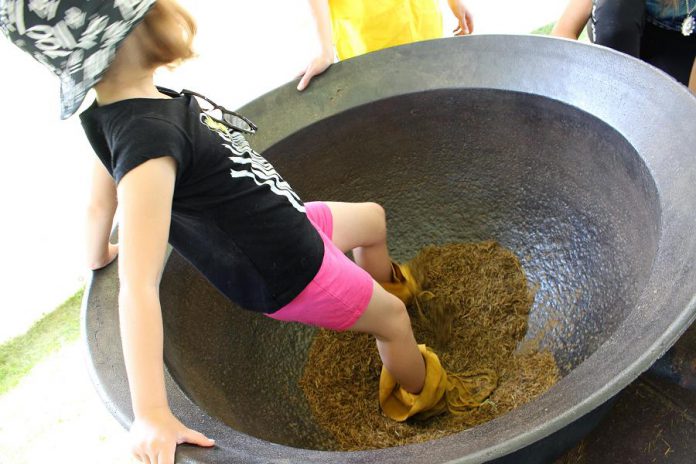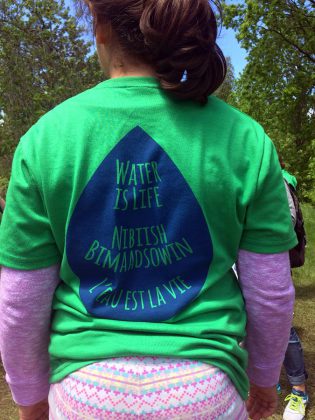
The place we live, Peterborough, is Anishinaabe or Ojibway territory and was originally named Nogojiwanong, which translates to “place at the end of the rapids.” For thousands of years, this region was a gathering spot where First Nations families and leaders shared ideas and knowledge.
Last week in Nogojiwanong, over 1,400 elementary school students in grades two to five gathered along the Otonabee River at the Riverview Park & Zoo to attend the Peterborough Children’s Water Festival (PCWF). In Ojibway, “Otonabee” means “the river that beats like a heart”, referring to the bubbling and boiling water of the rapids along the river — a perfect location to gather and learn about water.
The PCWF is a free educational event that brings together water educators, experts, and professionals in an effort to build a more sustainable relationship with water by positively shaping attitudes and behaviours within our community.
Children rotate through 34 activity centres, each linked to the Ontario Ministry of the Education curriculum, to learn a positive message about personal water awareness and respect for the natural environment through active, hands-on learning.
Over the last six years, the festival has integrated more Indigenous Knowledge into activity centres and workshops to help students understand their essential relationship to water and to the earth, through traditional teachings.
The Wild Rice Dance-off activity, led by James Whetung, invites children to lace up a pair of moccasins and to dance in a large cauldron of wild rice, a traditional practice used to remove the chaff from the grain of rice.
Also, the Gchi-Nibi activity centre is lead by TRACKS, Trent Aboriginal Cultural Knowledge and Science Initiative who bring water activities related to science and indigenous knowledge systems, largely Haudenosaunee and Anishinaabe.
New this year, Curve Lake First Nation Elder, Dorothy Taylor led Water Festival attendees in a traditional water teaching and water ceremony. The ceremony brought over eighty students together with music and drumming, a sage smudge, story telling, and lessons.
PCWF Coordinator Heather Ray explains:
“In aboriginal culture it is women who are responsible for caring for water, so the PCWF Steering Committee thought it only appropriate to invite Elder Dorothy Taylor, who has been working tirelessly to advocate for water within and between indigenous and non-indigenous communities.”
Taylor shared a segment of the creation story, which includes the four sacred waters; the water of the universe, spirit, world, and our veins. She explained that water is within us, and part of our bodies, helping children to understand that it is part of the lifeblood in all beings on earth.

Taylor continued by drawing a parallel to the land and our own mother by describing the land as mother, “Your mother cares for you and is kind to you. She feeds you and provides for you. How you feel about your mother, is how you feel about the earth, because the earth does the same for you. That is why we call the earth our mother.”
A special teaching followed, with a ceremonial copper bowl filled with water. Taylor led the participants in a group prayer of gratitude for the water, teaching the group to speak in Ojibway, saying together “Miigwech Nibi” meaning, “Thank you, water,” while raising the copper pot and inviting everyone to drink the water from their own hands.
“I want to encourage children to say thank you when they have a glass of water, or juice, or milk,” explains Taylor, “It is all water. If children can form a personal relationship with water, they will see it less as a commodity, as something you just buy in a bottle at the store, and more as a part of themselves. It will become special to them.”
Taylor has been working with the Sacred Water Circle since 2011 and continues to work closely with all levels of government, raising awareness and respect for water. She believes that if these lessons are available now to children, that when they are adults, working as lawyers, politicians, or engineers, that these teachings will be included in their work, and our waterways and groundwater will be cleaner and healthier.
“We are grateful to Curve Lake Elder Dorothy Taylor for attending this year’s festival,” shared Jenn McCallum, Steering Committee member with the PCWF. “Her ceremony was moving and impactful for the children who participated. It is important to the steering committee that indigenous perspectives are presented at the festival to recognize the sacredness of water, and its importance to our health and well-being.”
This year was the 16th Anniversary of the Peterborough Children’s Water Festival, which runs each year at the end of May. For more information about the festival, visit pcwf.net or contact PCWF Coordinator Heather Ray at heather.ray@greenup.on.ca.


























